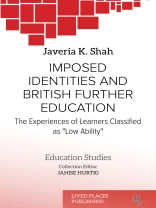What is the impact when a social identity is not chosen and embraced, but imposed upon you?
UK policy can be criticised for pressurising the education sector to funnel learners who fail their GCSEs into vocational learning courses such as Media Studies. With narratives drawn from the original, person-centred research conducted by the author in the Further Education sector, this book centres the often-discounted voices of the so-called “low ability” learners themselves.
They tell of the lack of agency that comes from having choices made for them, and the impact on their lives and identities as well as their post-education destinations. Featuring stories from a range of individual research participants, the book also explores intersectional issues, such as how race, ethnicity, socio-economic status, and language of origin can feed into the imposed identity and how it impacts their sense of self.
Tabla de materias
Introduction
Chapter 1: The Further Education policy context
Learning objective: Understanding the FE landscape
Chapter 2: Meet the staff
Learning objective: Policy enactment
Chapter 3: The experiences of negatively classified learners in their own words
Learning objective: Drawing on young people’s experiences
Chapter 4: What can we learn?
Learning objective: What can we learn?
Sobre el autor
Dr Janise Hurtig is an educational anthropologist and community educator and researcher. Her teaching and writing take place at the intersections of adult and popular education, gender and feminism, community development and social change in the Chicago area and in Venezuela. Janise received her Ph.D. in Anthropology from the University of Michigan. She is currently part-time faculty in De Paul University’s School for Continuing and Professional Studies, coordinator of the Community Writing Project, and an adult educator at the Howard Area Community Center.












